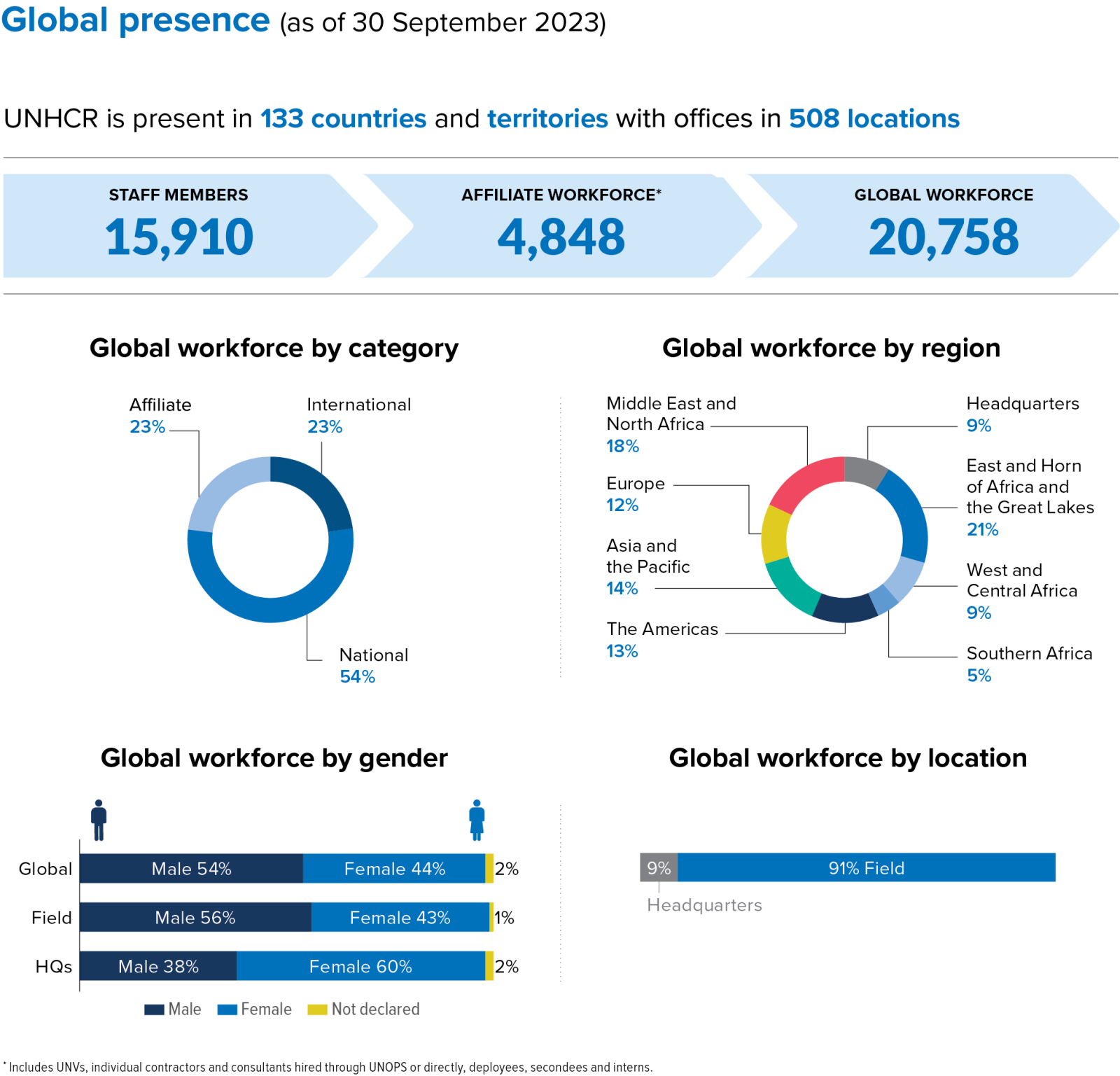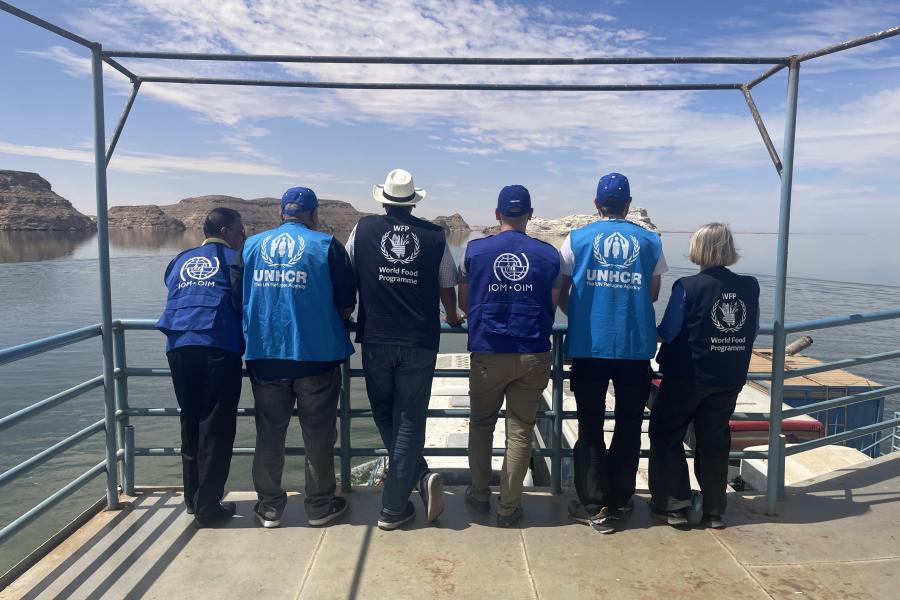Enabling Area 17: Efficient, modern, and streamlined systems and processes
In 2024, UNHCR will leverage new cloud-based business solutions in finance, and supply (Cloud ERP), partnerships (the Project Reporting Oversight and Monitoring Solution, PROMS) and external engagement (Synergy), making sure they function in an integrated way (Link). These follow the launch of two other systems under UNHCR’s Business Transformation Programme (BTP), transforming its approach to results-based management (COMPASS, in 2021) and human resources (Workday, in 2022). In 2024, UNHCR will prioritize the stabilization of BTP systems and train over 4,000 UNHCR and partner users of PROMS. It will support the wider UN system by sharing its experience with new digital solutions and practices through an inter-agency knowledge-sharing community. The results of an assessment of impact gains stemming from the BTP, performed with the support of the UN Advisory Alliance (UNAA), will be available in the second quarter of 2024.
UNHCR will also make further investments in data and digitalization.
Transformative efforts will not be confined to systems and will include a revision of existing processes and procedures, as prompted by the adoption of new technology. Changes planned within this enabling area will position UNHCR to be more agile, efficient, inclusive and collaborative, and to champion the global solidarity envisaged in the Global Compact on Refugees.
Enabling Area 18: Enhanced operational support, supply chain and technology
In line with its “Policy on emergency preparedness and response”, UNHCR will continue to strengthen country operations’ preparedness and response to multiple complex humanitarian emergencies and increased displacement, including due to climate change. This will be done by furthering emergency risk analysis and contingency planning, doubling emergency training capacity in view of increased deployment of UNHCR emergency roster members, maintaining the Emergency Surge team, and expanding dialogue with the standby partnership network to ensure that the emergency needs of country operations are met in a timely and effective manner.
UNHCR country operations will be supported to promote a safe working environment and apply security risk management processes to bring risk to within acceptable levels. This will be achieved through global security risk analysis, application of a personcentred approach, immediate response to critical security incidents, security learning, and engagement with the UN security management system.
In line with UNHCR’s “Strategic plan for climate action 2024–2030”, as one of the key actions to reduce its carbon footprint in 2024, UNHCR will further enhance the sustainability of its end-to-end supply chain. The Office will expand collaboration with other stakeholders to transition its supply management into a more purposeful, data-driven and strategic service. It will further engage in the sustainable procurement and delivery of core relief items (CRIs) from its global stockpiles, which are able to meet the emergency needs of up to 1 million people. For more details, please see the chapter on Climate Action and Outcome Area 8: Well-being and basic needs.
UNHCR will continue to promote a culture of innovation in the Office and plans to support the release of up to 80 operational innovation projects. Equipped with the largest fleet of vehicles in the UN Common System, UNHCR will focus on making its fleet safer and more climate-friendly through the introduction of more fuel-efficient vehicles. Building on the roll-out of ridesharing to over 100 offices in 2023, UNHCR will continue to explore ways to maximize more sustainable ways of transportation. Safety in transport will also be advanced by piloting the latest fleet management technologies.
Enabling Area 19: Strengthened human resources and improved organizational culture
UNHCR will continue its human resources transformation journey. The stabilization of Workday and its enhancements will continue in 2024. It will hone the potential of the workforce and ensure the deployment of people with the requisite skills. Workday’s performance management model, “Evolve” is expected to improve relations between managers and employees while developing staff skills and competencies for their current role and their future career. UNHCR will keep investing in training regional HR teams and the wider community of HR practitioners on race equality, gender parity, disability inclusion, and other aspects of diversity.
This initiative is an integral component of UNHCR’s broader institution-wide diversity, equity, and inclusion (DEI) priorities and objectives outlined in its DEI Strategic Framework. This serves as a structured roadmap guiding its intentional endeavours to promote these principles throughout the Office.
Leveraging the Occupational Health and Safety Framework and the mental health and well-being strategy, UNHCR will continue to reinforce the first line of support in high-risk duty stations and provide direct mental health and psychosocial services. The Office will also enhance the capabilities of its workforce through its innovation fellowship to enable better delivery on UNHCR’s mandate.
UNHCR will promote a safe working environment by deploying sound safety and risk management practices. It will advance global security risk analysis, upgrade its response to security incidents, and expand security learning and engagement with the UN security management system. UNHCR is committed to strengthening its risk management culture in all operational and management areas in line with the “Risk management 2025” strategy and will advance its level of risk maturity.
Better risk management will support informed decision-making, help teams mitigate risks and seize new opportunities, and lead to improved responses and operational impact.
UNHCR’s engagement in eradicating the root causes of sexual misconduct both in the workplace and against forcibly displaced and stateless people will continue in accordance with the “2023-2025 strategy and action plan”. In 2024, the Office will provide experiential training to UNHCR and partner workforce on detecting, preventing and responding to sexual misconduct. Expansion of the Victim Care function, and the promotion of tools and initiatives such as NotOnlyMe and the joint UNHCR-ICVA “Protection from sexual exploitation and abuse outreach and communication fund” will increase support to survivors. UNHCR will continue to streamline and coordinate efforts in this regard, integrating protection from sexual exploitation and abuse into emergency response mechanisms.

Enabling Area 20: Enhanced partnerships, coordination, public outreach, and resource mobilization
UNHCR will strengthen its communication to foster solidarity with refugees, advocate for their right to safety, promote their inclusion, mobilize funding, and combat hate speech targeting them. UNHCR will seek to diversify and strengthen partnerships at the global and regional levels in support of people forced to flee and stateless persons. It will collaborate to link up humanitarian, development and peacebuilding work, promoting localization and accountability to affected populations.
UNHCR will step up efforts to ensure forcibly displaced and stateless people are included in UN programmes as well as national humanitarian and development policies and plans. It will leverage strategic partnerships within the United Nations family, built upon complementary expertise, and will maintain its engagement with NGOs and civil society, including sport actors, as strategic partners to advance operational, policy and advocacy priorities at the country level, and to achieve global advocacy goals.
UNHCR will look at how to further promote meaningful participation of organizations led by forcibly displaced and stateless people, to influence policy discussions and shape the responses.
UNHCR will exercise effective field leadership and coordination in line with the Refugee Coordination Model (RCM) and Inter-Agency Standing Committee frameworks, proactively contributing to the development of inter-agency policies, guidance and tools, training and support to operations on inter-agency matters, maintaining a roster of inter-agency experts, and furthering the inclusion of forcibly displaced and stateless people in inter-agency documents.
UNHCR will strengthen strategic partnerships with media organizations, key players in public advocacy, academia and civil society through better identification and inclusion of civil society actors in strategic processes.
More information on UNHCR resource mobilization, including public and private sector fundraising and RRPs, is available in the chapter on Funding UNHCR’s programmes.
Enabling Area 21: Effective strategic leadership and governance and independent oversight
Through high-level representation and engagement, including with UNHCR’s Executive Committee, States, government and non-government entities, political leaders, regional and international organizations, the private sector, and through strategic partnerships with UN and other entities, UNHCR will promote and enhance protection and solutions. UNHCR will continue to organize the annual cycle of governance meetings and coordinate the preparation of relevant reports.
UNHCR will continue to build a culture that is results-oriented, risk mature, and evidence driven. Strengthening accountability to the people UNHCR serves is a priority. In 2024, UNHCR will focus on supporting the use of evaluation as a management tool, improving evaluation practices, quality assurance, and sharing lessons and evidence. The recent practice of embedding evaluations into operational budgets will continue. Particular attention will be made to ensuring that the evaluation recommendations are incorporated into planning and reporting processes. UNHCR foresees a gradual expansion in the number of evaluations at country and regional levels and where large programmes or innovative projects need to demonstrate value and scalability. The results of an independent evaluation of UNHCR’s regionalization reform will inform any further “fine-tuning” required in the functions of Headquarters and the Regional Bureaux.
UNHCR welcomes oversight as a means to enhance operational effectiveness and address lapses in integrity. In 2024, the Inspector General’s Office (IGO) will continue its work to ensure UNHCR has an efficient and effective independent oversight system. It will provide strategic guidance and insights from investigations and oversight recommendations, thereby enabling management to improve UNHCR’s systems and processes.
Given the record number of complaints of misconduct received (itself a function of trust and improved reporting mechanisms) the IGO will seek ways to ensure the appropriate handling of complaints and expand its capacity to undertake proactive work, including analysis of irregularities amounting to fraud. Initiatives launched in 2023 to enhance the IGO’s work will continue to take shape in 2024, including those related to digital forensics and artificial intelligence systems.








